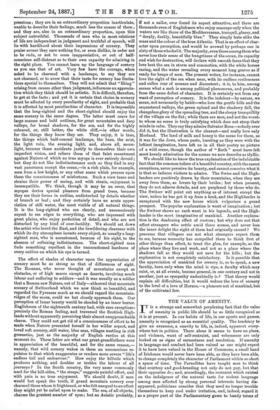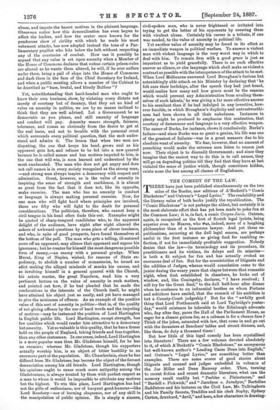THE VALUE OF AMENITY.
IT is a strange and somewhat perplexing fact that the value of amenity in public life should be so little recognised as it is at present. In our habits of life, in our sports and games, amenity is recognised as an essential quality. The tendency to give an evenness, a suavity to life, is, indeed, apparent every- where but in politico. There alone it seems to have no place, and violence, want of self-restraint, and vehemence are only looked on as signs of earnestness and resolution. If amenity in language and conduct had been valued as one might expect it to have been valued in the House of Commons, a small band of Irishmen would never have been able, as they have been able, to change completely the character of Parliament within so short a space of time. The Parnellites have taught men to think that courtesy and good-breeding not only do not pay, but that their opposites do ; and, accordingly, the restraint which existed on the indulgence of the natural taste for violent language among men affected by strong personal interests having dis- appeared, politicians consider that they need no longer trouble themselves to keep cool under irritation, and, indeed, regard it as a proper part of the Parliamentary game to bandy terms of
abuse, and impute the basest motives in the plainest language. Observers notice how this demoralisation has even begun to affect the leaders, and how the orator once known for the ponderous show of civility with which he made his moat vehement attacks, has now adopted instead the tone of a Par- liamentary pugilist who hits below the belt without respecting any of the courtesies of combat. How can it possibly be argued that any value is set upon amenity when a Member of the House of Commons declares that unless certain prison-rules are altered as he wants them altered, he will, if he ever suffers under them, bring a pail of slops into the House of Commons and dash them in the face of the Chief Secretary for Ireland, and when a public meeting allows a member of the Cabinet to be described as "base, brutal, and bloody Balfour "P Yet, notwithstanding that hard-headed men who ought to know their own business, show, by violating every dictate not merely of courtesy but of decency, that they set no kind of value on amenity in politics, we are by no means inclined to think that they are well advised. Let a Government be as democratic as you please, and still amenity of language and conduct will pay. Amenity means strength, fairness, tolerance, and comes so obviously from the desire to get at the real issue, and not to trouble with the personal cruet which surrounds every political question, that the mob under- stand and admire it. The lesson that when two men are disputing, the one that keeps his head, grows cool as his opponent gets hot, and refuses to be led into a new quarrel because he is called names and has motives imputed to him, is the one that will win, is soon learned and understood by the most uneducated. The man who does not get angry and does not call names is in every society recognised as the strong man, —and strong men always inspire a democracy with respect and admiration. Great, however, as is the value of amenity in inspiring the sense of strength and confidence, it is almost as great from the fact that it does not, like its opposite, make enemies. The man who has no amenity in conduct or language is always making personal enemies. Now, for one man who will fight hard where principles are involved, there are fifty who will fight to the death for personal considerations. The politician, therefore, who cannot keep a civil tongue in his head often finds this out. Examples might be quoted of sharp-tongued candidates who, to the apparent delight of the audience, have night after night silenced the askers of awkward questions by some piece of clever insolence, and who, in spite of good prospects, have found themselves at the bottom of the poll. The man who gets a telling, ill-natured score off an opponent, may silence that opponent and expose his ignorance ; but he creates for himself the most dangerous possible form of enemy,—an enemy with a personal grudge. When Murat, King of Naples, wished, for reasons of State ex- pediency, to abolish a number of monasteries, he issued an edict making the alleged misdeeds of monks his excuse, and so involving himself in a general quarrel with the Church, his astute master, the great Napoleon, read him a very pertinent lecture on the value of amenity in such matters, and pointed out how, if be had pleaded that he made the confiscations in the interests of the Church itself, he might have attained his object just as easily, and yet have managed to give the minimum of offence. As an example of the positive value of this sort of amenity in politics—that is, of the quality of not giving offence by the use of hard words and the imputing of motives—may be instanced the position of Lord Harlington in English public life. Lord Harlington, except strength, has few qualities which would render him attractive to a democracy but amenity. Yet so valuable is this quality, that he has a firmer hold on the people of England, taking friends and foes together, than any other statesman. In one sense, indeed, Lord Hartington is a more popular man than Mr. Gladstone himself, for he has no enemies ; whereas Mr. Gladstone, though his supporters actually worship him, is an object of bitter hostility to an enormous part of the population. Mr. Chamberlain, since he has differed from Mr. Gladstone, has become the object of the fiercest denunciation among his old friends. Lord Hartington, though his opinions ought to cause much more antipathy among the Gladstoniaus, is always treated by them with perfect respect as a man to whom it would be impossible to attribute any motives but the highest. To win this place, Lord Hartington has had not the gifts of enthusiasm, nor of buoyant good-humour—like Lord Rosebery—nor of burning eloquence, nor of any skill in the manipulation of public opinion. He is simply a sincere, civil-spoken man, who is never frightened or irritated into trying to get the better of his opponents by covering them with virulent abuse. Certainly his career is a tribute, if one was needed, to the value of amenity in political life.
Yet another value of amenity may be found in its effect as an immediate weapon in political warfare. To answer a violent man with violent language is the very worst way in which to deal with him. To remain firm with a good grace is just as important as to yield gracefully. There is no such effective answer as silence, or else language which shall make as violent a contrast as possible with the intemperance of the attack to be met When Lord Melbourne answered Lord Brougham's furious but astonishingly able attack on his Ministry by declaring that he felt sure their lordships, after the speech they had just heard, would realise how many and how grave must be the reasons which would prevent any Administration from availing them- selves of such talents,' he was giving a far more effective answer to his assailant than if he had indulged in any invective, how- ever forcible, in which Brougham's duplicity and untrustworthi- ness had been shown in all their nakedness. Instances in plenty might be produced to emphasise this contention, that courtesy of demeanour and language is a very effective weapon. The career of Burke, for instance, shows it conclusively. Burke's failure—and since Burke was so great a genius, his life was one of the greatest of failures—was in a great measure due to his absolute want of amenity. We fear, however, that no amount of preaching would make the extreme men listen to reason just now. Their object is to discredit Government; and since they imagine that the easiest way to do this is to call names, they will go on degrading politics till they find that they have at last violated the sense of justice which, though sometimes hidden, exists none the less among all classes of Englishmen.



































 Previous page
Previous page